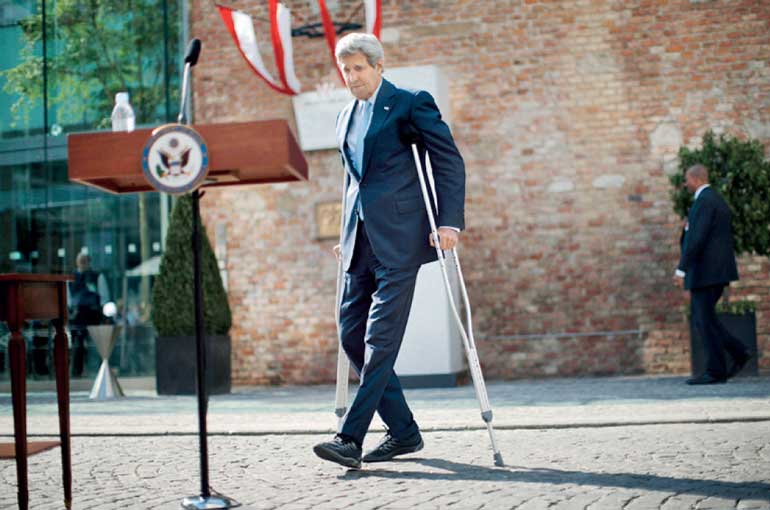Sunday Feb 22, 2026
Sunday Feb 22, 2026
Monday, 6 July 2015 00:00 - - {{hitsCtrl.values.hits}}
 U.S. Secretary of State John Kerry walks using crutches to deliver a statement on the Iran talks in Vienna, Austria July 5, 2015. The top U.S. and Iranian diplomats met for a sixth consecutive day on Sunday to try to resolve obstacles to a nuclear accord, including when Iran would get sanctions relief and what advanced research and development it may pursue. Iran and the United States have made “genuine progress” on a nuclear deal but there are several difficult issues to resolve and Washington is ready to walk away from the talks if need be, Kerry said on Sunday. REUTERS
U.S. Secretary of State John Kerry walks using crutches to deliver a statement on the Iran talks in Vienna, Austria July 5, 2015. The top U.S. and Iranian diplomats met for a sixth consecutive day on Sunday to try to resolve obstacles to a nuclear accord, including when Iran would get sanctions relief and what advanced research and development it may pursue. Iran and the United States have made “genuine progress” on a nuclear deal but there are several difficult issues to resolve and Washington is ready to walk away from the talks if need be, Kerry said on Sunday. REUTERS
Reuters: An Iranian nuclear agreement is possible this week if Iran makes the “hard choices” necessary, but if not, the United States remains ready to walk away from the negotiations, U.S. Secretary of State John Kerry said on Sunday.
Speaking after his third meeting of the day with Iranian Foreign Minister Mohammad Javad Zarif, Kerry said they had made “genuine progress” in talks over the last few days but “several of the most difficult issues” remain.
“If hard choices get made in the next couple of days, made quickly, we could get an agreement this week, but if they are not made we will not,” he said outside the hotel where talks between Iran, the United States and five other powers are being held.
Foreign ministers from Britain, China, France, Germany and Russia were expected to begin arriving on Sunday evening as the major powers make a major push to meet Tuesday’s deadline for a final agreement to end the 12-year-old dispute.
Kerry said negotiators were still aiming for that deadline, but other diplomats have said the talks could slip to July 9, the date by which the Obama administration must submit a deal to Congress in order to get an expedited, 30-day review.
The agreement under discussion would require Iran to curb its most sensitive nuclear work for a decade or more in exchange for relief from sanctions that have slashed its oil exports and crippled its economy.
U.S. President Barack Obama’s administration, which has been accused of making too many concessions by Republican members of Congress and by Israel, remains ready to abandon the talks, Kerry said.
“If we don’t have a deal and there is absolute intransigence and unwillingness to move on the things that are important for us, President Obama has always said we’re prepared to walk away,” he said.
The top U.S. and Iranian diplomats met for a sixth consecutive day on Sunday to try to resolve obstacles to a nuclear accord, including when Iran would get sanctions relief and what advanced research and development it may pursue.
Keeping up a what has been a steady stream of criticism, Israeli Prime Minister Benjamin Netanyahu said the United States and major powers were negotiating “a bad deal”.
“It seems that the nuclear talks (with) Iran have yielded a collapse, not a breakthrough,” he said according to remarks released by his office, saying the deal would pave the way to Iran making nuclear bombs and increasing regional aggression.
While they have made some progress on the type of bilateral sanctions relief that Iran may receive, the two sides remain divided on such issues as lifting United Nations sanctions and on its research and development of advanced centrifuges.
“Many of the issues related to sanctions have been resolved, and there are four or five issues that remain including the important topic of ensuring both sides’ steps correspond to each other and happen at the same time,” Iranian Deputy Foreign Minister Abbas Araqchi was quoted as saying by the ISNA agency.
The major powers suspect Iran of trying to develop a nuclear weapons capability. Iran says its nuclear program is solely for peaceful purposes such as producing medical isotopes and generating electricity.
Diplomats close to the negotiations have said they had tentative agreement on a mechanism for suspending U.S. and European Union sanctions on Iran.
But the six powers had yet to agree with Iran on a United Nations Security Council resolution that would lift U.N. sanctions and establish a means of re-imposing them in case of Iranian non-compliance with a future agreement.
The negotiators missed a June 30 deadline for a final agreement, but have given themselves until July 7.